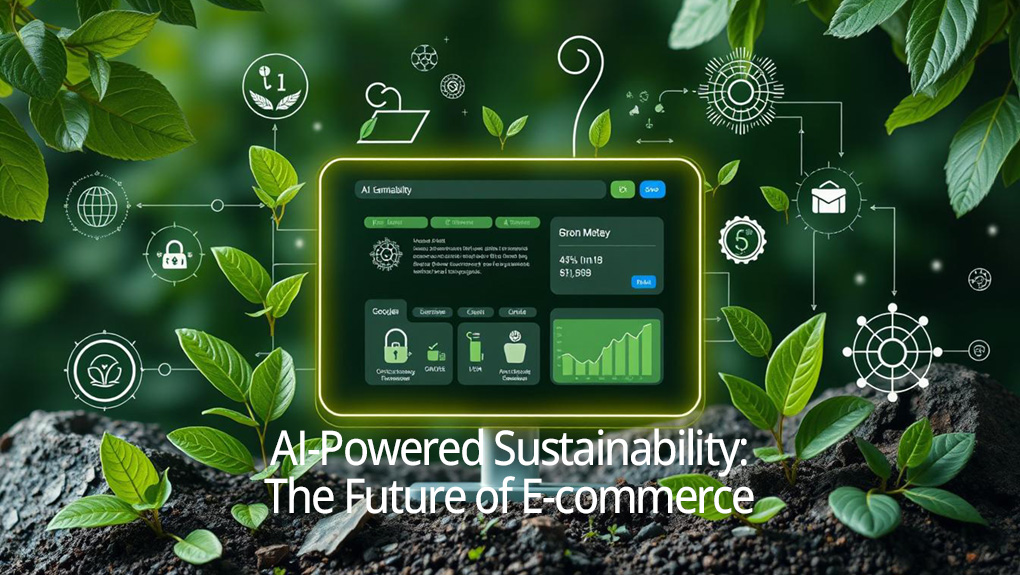|
Getting your Trinity Audio player ready...
|

The world is becoming increasingly conscious of the impact of human activities on the environment, and businesses are not exempt from this scrutiny. E-commerce, a sector that has seen explosive growth in recent years, is now under pressure to adopt sustainable practices. As consumers demand more eco-friendly options, companies are turning to artificial intelligence (AI) to help reduce their carbon footprints and promote sustainability. This article explores how AI is transforming e-commerce into a greener industry and what this means for the future of online shopping.
The Environmental Impact of E-commerce
E-commerce has undoubtedly revolutionized the way we shop. It offers convenience, variety, and often better prices than traditional brick-and-mortar stores. However, this convenience comes with environmental costs. The carbon footprint of e-commerce includes emissions from packaging, transportation, and the energy consumed by data centers that power online platforms.
Packaging waste is a significant issue in e-commerce. The sheer volume of products being shipped globally means an equally massive amount of packaging materials, much of which is non-recyclable. Additionally, the transportation of goods, particularly through last-mile delivery, contributes heavily to greenhouse gas emissions.
Data centers, the backbone of e-commerce platforms, also have a considerable environmental impact. These facilities require massive amounts of electricity to operate and cool servers, leading to a significant carbon footprint. With the rapid growth of e-commerce, the demand for data storage and processing power is only expected to increase, exacerbating this issue.
How AI is Making E-commerce More Sustainable
AI is emerging as a powerful tool to help e-commerce companies reduce their environmental impact. Here are some of the ways AI is driving sustainability in the industry:
1. Optimizing Supply Chains
Supply chains are the lifeblood of e-commerce, and optimizing them can significantly reduce carbon emissions. AI algorithms can analyze vast amounts of data to identify inefficiencies in the supply chain, from production to delivery. By predicting demand more accurately, AI can help companies reduce overproduction, minimize waste, and optimize inventory levels.
Moreover, AI can assist in route optimization for deliveries, reducing the distance traveled and, consequently, the carbon emissions associated with transportation. By analyzing traffic patterns, weather conditions, and other variables, AI can ensure that delivery vehicles take the most efficient routes, saving fuel and reducing emissions.
2. Reducing Packaging Waste
One of the most visible aspects of e-commerce’s environmental impact is packaging waste. AI can help companies design more sustainable packaging solutions by analyzing customer preferences, product dimensions, and shipping requirements. By optimizing packaging size and materials, companies can reduce the amount of waste generated and lower shipping costs.
AI-powered tools can also suggest alternative packaging materials that are biodegradable or recyclable, helping companies align with their sustainability goals. Some companies are even exploring AI-driven customization of packaging, ensuring that products are packed in the most efficient and eco-friendly way possible.
3. Enhancing Energy Efficiency in Data Centers
Data centers are essential for e-commerce operations, but they consume vast amounts of energy. AI can play a crucial role in improving the energy efficiency of these facilities. Machine learning algorithms can analyze data from sensors and other monitoring devices to optimize cooling systems, reducing the energy required to keep servers at optimal temperatures.
Additionally, AI can help data centers transition to renewable energy sources by predicting energy demand and supply. By integrating AI with smart grid technology, data centers can better manage their energy consumption and reduce their reliance on fossil fuels.
4. Personalizing Customer Experiences to Reduce Returns
Returns are a significant source of waste in e-commerce, both in terms of carbon emissions from transportation and the disposal of returned products. AI-driven personalization can help reduce the number of returns by ensuring that customers receive products that meet their needs and preferences.
By analyzing customer data, AI can provide personalized recommendations, helping customers make more informed purchasing decisions. This reduces the likelihood of returns and the associated environmental impact. Moreover, AI can assist in improving product descriptions and images, giving customers a better understanding of what they are buying and further reducing the chances of returns.
5. Supporting Sustainable Practices in Manufacturing
AI is not only transforming e-commerce platforms but also the way products are manufactured. By integrating AI into the manufacturing process, companies can reduce waste, improve energy efficiency, and create more sustainable products.
For example, AI can optimize the use of raw materials, ensuring that resources are used efficiently and minimizing waste. In addition, AI-driven quality control systems can detect defects early in the production process, reducing the need for rework and saving resources.
Furthermore, AI can assist in the development of new, sustainable materials by analyzing the properties and performance of different materials. This can lead to the creation of products that are not only eco-friendly but also more durable and efficient.
The Role of AI in Promoting Sustainable Consumer Behavior
While AI is helping e-commerce companies reduce their carbon footprints, it also has the potential to influence consumer behavior toward more sustainable practices. Here are some ways AI is promoting eco-friendly shopping habits:
1. Educating Consumers
AI-powered chatbots and virtual assistants can provide consumers with information about the environmental impact of their purchases. By offering insights into the carbon footprint of products, the sustainability of materials used, and the eco-friendliness of shipping options, AI can help consumers make more informed decisions.
Moreover, AI can be used to create personalized content that educates consumers about sustainability. For instance, AI-driven marketing campaigns can highlight the benefits of choosing eco-friendly products or adopting more sustainable shopping habits.
2. Encouraging Sustainable Choices
AI can also nudge consumers toward more sustainable choices by offering personalized recommendations based on their preferences and past behavior. For example, AI algorithms can suggest eco-friendly alternatives to commonly purchased products or highlight brands that prioritize sustainability.
Additionally, AI can be used to create loyalty programs that reward customers for making sustainable choices. By offering incentives for purchasing eco-friendly products or opting for greener shipping options, companies can encourage more sustainable consumer behavior.
3. Facilitating Circular Economy Models
The circular economy is an emerging concept that aims to minimize waste and make the most of resources by keeping products and materials in use for as long as possible. AI can play a crucial role in facilitating circular economy models in e-commerce.
For example, AI can help companies manage reverse logistics more efficiently, enabling them to collect, refurbish, and resell returned products. By analyzing data on product returns, AI can identify patterns and predict which products are likely to be returned, allowing companies to take proactive measures to reduce waste.
Moreover, AI can assist in the creation of platforms that enable consumers to buy, sell, or trade used products, extending the life cycle of goods and reducing the demand for new resources.
Challenges and Considerations
While AI holds great promise for making e-commerce more sustainable, there are challenges and considerations to keep in mind. The development and implementation of AI technologies require significant investment, and not all companies may have the resources to adopt these solutions.
Moreover, the use of AI in e-commerce raises concerns about data privacy and security. As companies collect and analyze vast amounts of consumer data, they must ensure that this information is protected and used responsibly.
Finally, it’s important to recognize that AI is not a panacea for all of e-commerce’s environmental challenges. While AI can help reduce carbon footprints and promote sustainability, it must be part of a broader strategy that includes regulatory measures, consumer education, and corporate responsibility.
The Future of AI and Sustainability in E-commerce
As AI continues to evolve, its potential to drive sustainability in e-commerce will only grow. Companies that embrace AI-driven sustainability initiatives stand to benefit not only from reduced environmental impact but also from increased consumer trust and loyalty.
In the future, we can expect to see even more innovative applications of AI in e-commerce, from AI-powered sustainability reporting tools to advanced supply chain optimization solutions. As consumers become increasingly eco-conscious, companies that prioritize sustainability will be better positioned to thrive in the competitive e-commerce landscape.
Moreover, as AI technology becomes more accessible, smaller businesses will also be able to leverage these tools to reduce their carbon footprints and promote sustainability. This democratization of AI will be key to driving widespread adoption of sustainable practices across the e-commerce industry.
Ultimately
AI is playing a transformative role in making e-commerce more sustainable, helping companies reduce their carbon footprints and promote eco-friendly practices. From optimizing supply chains and reducing packaging waste to enhancing energy efficiency in data centers and personalizing customer experiences, AI is driving significant improvements in the environmental impact of e-commerce.
As we look to the future, the integration of AI in e-commerce will be crucial in addressing the industry’s environmental challenges. By embracing AI-driven sustainability initiatives, companies can not only reduce their carbon footprints but also build stronger relationships with consumers who are increasingly prioritizing sustainability in their purchasing decisions.
P.S. If you’re looking to elevate your digital presence and navigate your own journey to success, reach out to Cosmos Revisits for tailored marketing strategies that can help you achieve your goals.


